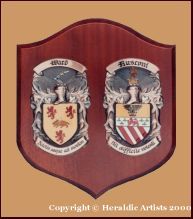Over the years many Irish men and women walked the road to the boat, determined to carve a better life for themselves in the new worlds expanding before them. Today we admire their a chievements and note with pride their ability to transcend the barriers of life and death by passing their Irish identity to their children. It is their sense of belonging to that empty chair at the table that transcends the generations and prompts their descendants to make the return trip in their place. To make the return trip you should be prepared. This will ensure you have a memorable holiday, visiting places familiar to your ancestors and relating family stories and history to actual places in Ireland. General information on family history is readily available for most families (see family histories) so we shall concentrate on how to trace ancestors. Start by compiling an outline family tree. Next, approach members of your family for help in closing the gaps. If you get stuck a guide book such as Handbook on Irish Genealogy will prove helpful or you could look to your local State archives for assistance. The most important facts to discover are; the full name, date of birth and county of origin of the emigrant ancestor. A print out of locations where a surname occurred in the 1800's may help (see Computerised Family History Service), particularly if you have a problem finding the place of origin of the ancestor. After some serious research you will realise that parish registers are the most important source when tracing ancestors in Ireland. They are generally found in the local parish church or offices, with microfilm copies available for study in the National Library, Kildare Street, Dublin 2. Personal callers can also avail of the library's advice service. Census records, wills, microfilm copies of Church of Ireland parish registers, the Tithe Applotment books for the Republic and records relating to convicts, Irish uprisings and nationalist movements are housed in the National Archives, Bishop St., Dublin 8. The registers of births, marriages and deaths from 1864 are kept in The General Register Office, 8-11 Lombard Street East, Dublin 2. The Registry of Deeds, Kings Inn's, Henrietta Street, Dublin 1 has deeds and records going back to 1708. The Registrar General's Office of Northern Ireland, Oxford House, Chichester Street, Belfast BT1 4JY holds the registers of births, marriages and deaths from 1921 for the six counties. The Public Record Office of Northern Ireland, 66 Balmoral Avenue, Belfast BT9 6NY houses the Tithe Applotment Books and the Church of Ireland registers for the six counties of Northern Ireland. At this stage a good do-it-yourself guidebook: Handbook on Irish Genealogy will answer many of your questions. Additional sources such as wills, censuses, deeds, gravestone inscriptions etc. are detailed in Irish Genealogy: A Record Finder. Alternatively, you may wish to inquire casually about your origins while enjoying a holiday in Ireland and perhaps attempt to contact lost relatives by placing an advertisement regarding your ancestors in the local newspaper etc. Advice on this method of research is found in The Ancestor Trail in Ireland: A Companion Guide. We wish you every success in your search and hope you will visit us on your next trip to Ireland. Home ~ Double Plaques ~ Single Plaques ~ Scrolls, Parchments & Trees Tracing Irish Roots ~ Surname Books ~ Special Offers e-mail: sales@heraldicartists.com
|
